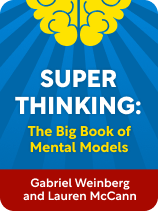

This article is an excerpt from the Shortform book guide to "Super Thinking: The Big Book of Mental Models" by Gabriel Weinberg and Lauren McCann. Shortform has the world's best summaries and analyses of books you should be reading.
Like this article? Sign up for a free trial here.
What are “first principles” in philosophy? What are some things you should keep in mind when reasoning from first principles?
First principles are self-evident assumptions that ground your reasoning. For example, in deciding which career path to pursue, you might follow the first principle that upward mobility is valuable.
Here are some things you should watch out for when using the first-principles method of reasoning.
Reason From First Principles
First principles provide a sturdy foundation for our beliefs, helping us avoid the shortcomings of conventional thinking. Because the assumptions underlying conventional thinking are often misguided, using first principles can help us avoid them.
For example, conventional astronomy once placed the Earth at the center of the solar system. However, Copernicus rejected this conventional view because he accepted the first principle that the most logical mathematical model of stars’ movements was correct. Since the heliocentric model was the best mathematical model of the stars, Copernicus accepted it instead.
(Shortform note: Reasoning from a foundation of self-evident assumptions isn’t a novel idea—René Descartes proposed a similar approach, called foundationalism, in his Meditations on First Philosophy. However, many have rejected the notion of self-evident assumptions as illusory. For example, Euclidean geometry rests on the seemingly self-evident assumption that two parallel lines never intersect. But even this assumption has been rejected—mathematicians like Carl Gauss have constructed coherent systems which deny this “parallel postulate.” So, it’s best to treat even self-evident assumptions with skepticism.)
De-Risk Assumptions
Still, even seemingly self-evident assumptions can be mistaken. To avoid false assumptions infiltrating your reasoning, Weinberg and McCann recommend another mental model: De-risk your assumptions by testing their validity with objective measures.
This de-risking process can look different depending on the assumption. For instance, a conservative political candidate might assume they’ll comfortably win historically Republican districts. In this case, de-risking might involve conducting a poll to test this assumption.
(Shortform note: De-risking works well for empirical assumptions, but it’s less practical for value judgments. For instance, Weinberg’s company, DuckDuckGo, assumes that promoting internet privacy is valuable. To take another example, PETA assumes that speciesism—the view that certain species are inherently superior—is wrong. It’s unclear how to de-risk either of these assumptions—we can’t run experiments to determine the truth of speciesism or the value of privacy. When your assumptions can’t be de-risked, it’s best to proceed with caution.)
Account for Your Frame of Reference
False assumptions aren’t only a risk when reasoning from first principles—we’re also susceptible to false assumptions rooted in our own perspective. For example, consider a model from Einstein’s theory of relativity, the frame of reference. In physics, an object’s frame of reference is roughly its location relative to which its speed and direction can be measured. To oversimplify, we could say that relative to our location inside a moving airplane, we’re currently stationary, though relative to the location of the airport, we’re currently traveling north at 550 mph.
We all have our own personal frames of reference, our subjective experience through which we perceive the world. To reason objectively, we need to keep in mind our own frame of reference and the biases afflicting it.
Weinberg and McCann caution that one factor impacting our frame of reference is availability bias, where we overemphasize recently acquired information. For instance, a news report about recent shark attacks might make us think they’re a major issue, when they actually only cause about one fatality every other year.
| Exploiting Your Frame of Reference to Influence Your Decisions In Nudge, Richard Thaler and Cass Sunstein argue that policymakers and businesses should exploit biases in our frame of reference to “nudge” us toward better decisions. They suggest techniques including: – Narrowing our available decisions—for example, payment menus might offer only three possible tip options. – Implementing default decisions—for example, subscriptions might offer a free trial period, then default to charging you once the trial ends. – Offering clear incentives—for example, Germany pays you for each bottle you recycle. Although Thaler and Sunstein encourage nudging consumers to make better decisions, beware of organizations that attempt to nudge you toward undesirable decisions. For instance, some businesses use payment prompts to nudge you toward “guilt tipping,” where you tip an unreasonably high amount. By only listing exorbitant tip options, these businesses exploit your availability bias to your detriment. |

———End of Preview———
Like what you just read? Read the rest of the world's best book summary and analysis of Gabriel Weinberg and Lauren McCann's "Super Thinking: The Big Book of Mental Models" at Shortform.
Here's what you'll find in our full Super Thinking: The Big Book of Mental Models summary:
- How to elevate your everyday reasoning and decision-making skills
- Why you shouldn't rely on intuition when making decisions
- How to deter you opposition from engaging in conflict






